
Technical Webinar Series
Episode 3: All About Mycotoxins
Thursday, June 28 at 3 p.m. GMT+2
Join Dr. Alex Yiannikouris, research group director of the chemistry division at Alltech, for the third in a series of live webinars that will provide a technical overview on mycotoxins.
Going back to basics on the fundamentals behind mycotoxin detection and mitigation strategies, this webinar will dive into mycotoxin chemistry, the mode of action of Mycosorb™ and the chemistry of interactions.
Topics include:
- Mycotoxin testing
- Beyond single mycotoxin testing, the genesis of the multiplex testing.
- Theoretical simplicity, practical ambiguity and applied complexity. A decade of fundamental analytical advancements have made possible the detection of multiple mycotoxins at once and we have seen a dramatic increase of the number of testing solutions appearing on the marketplace. From rapid methods for high throughput screening; qualitative and semi-quantitative old-fashioned ELISA testing; development of appealing testing kits such as lateral flow devices; multi-mycotoxin non-selective ELISA microplates; to the complex but absolute quantification using LC-MS/MS and the success learned from the Alltech 37+®testing and surveying experience.
- Understanding the impact of mycotoxins
- Assessing their negative impact on animal performances.
- Modelling and categorising the risk associated with the presence of mycotoxins for improving mycotoxin mitigation strategy recommendation.
- Prevention and control strategies
- The fine chemical characteristics of the mode of action of Mycosorb® toward mycotoxins.
- What are the important elements to obtain an optimised adsorption of mycotoxin and what are the important factors?
- How complex and highly dynamic carbohydrate structure conformations are responsible for the kinetic of adsorption and the spectrum activity of the product.
- Examples of the application of the adsorption strategy in vitro, ex vivo, and in vivo including emphasis on the pharmacokinetics of mycotoxin when a mitigation strategy is applied.
- Importance of the spectrum of activity on the overall mitigation impact.
Register for the webinar now:
Thursday, June 28 at 3 p.m. GMT+2
If you have questions you would like us to address during the webinar, please email them in advance to hgeraghty@alltech.com.
About the speaker
Dr. Alex Yiannikouris obtained his doctoral degree in biochemistry in 2004 from Blaise-Pascal University, co-supported by Alltech, Inc. and the National Institute of Agronomic Research (INRA), France, following his bachelor’s and master’s degrees in cellular biology, microbiology and parasitology and a master’s degree in human nutrition and food science. Yiannikouris joined Alltech-France in 2004 while completing a post-doctoral commitment in environmental analytical chemistry in the laboratories of the National Council of Scientific Research (CNRS), France. He then joined Alltech’s Center for Animal Nutrigenomics and Applied Animal Nutrition, based at the company’s international headquarters in Nicholasville, Kentucky, USA, in 2007.
Yiannikouris is currently the research group director—speciality chemistry, leading research and development programs in the field of mycotoxins and food chain contaminants and related mitigation strategies, as well as bioactive ingredients. Furthermore, he is leading the implementation of state-of-the-art and high throughput research technologies in scientific programs for advancement in analytical methods development. He is part of the Alltech Mycotoxin Management team as the research director and field expert, and he provides global technical support for commercial, marketing and regulatory departments worldwide. He has given lectures in more than 50 different countries and has authored over 100 scientific articles and international communications.
Beginning in June 2015, Yiannikouris is also an adjunct assistant professor at the Department of Animal and Food Sciences of the University of Kentucky, in the USA. His scientific interests have focused on multi-disciplinary approaches that join biochemistry, organic chemistry, microbiology, analytical chemistry, mathematical modeling, in silico molecular mechanics, genomics, metabolomics, proteomics disciplines for elucidating the biochemistry behind the sequestering activity of natural and synthetic adsorbents toward mycotoxins and studying the distribution and bioactivity of organic versus inorganic sources of trace elements for animal nutrition and life sciences projects. He is also involved in scientific programs measuring metabolites and biomarkers of exposure in different animal and vegetal matrices applied to the fields of mycotoxins, antioxidants and trace element bioavailability, with a special emphasis on mass spectrometry applications.
